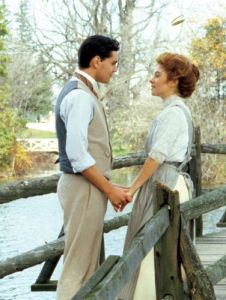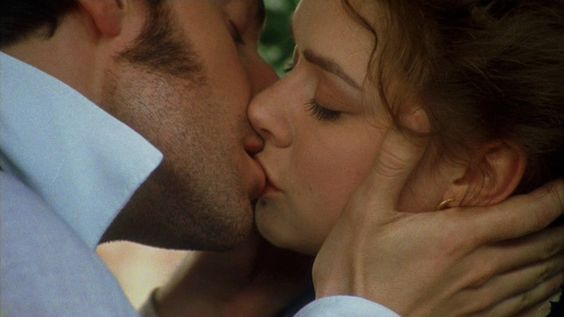Romance Novels: To Happy Ending or Not to Happy Ending?
 Last week, Book Riot posed the question: Should romance novels always have happy endings? I shared the link to the Romance genre forum for discussion among the alumni and current students of the Writing Popular Fiction program at my grad school, Seton Hill University.
Last week, Book Riot posed the question: Should romance novels always have happy endings? I shared the link to the Romance genre forum for discussion among the alumni and current students of the Writing Popular Fiction program at my grad school, Seton Hill University.
Book Riot directs the conversation this way:
As a romance reader who has been reading the genre for more than a decade now, I honestly feel a little conflicted about books that are labeled “romance” but lack a happy ending for the main couple. I’m sure non-HEA romances existed before the last couple years, but I think the existence of social media has definitely put a spotlight on things that people are upset about. . . .
Most of the time, these endings are not indicated in any way by the jacket copy, which is fair. You don’t want to read a description of the book and have the ending ruined by an, “Oh, by the way, everyone dies at the end.” But when readers come to expect a certain ending, it almost feels a little bit like betrayal. . . .
There’s this unspoken contract between a romance author and a reader, this element of trust. We know that this authors may put us through an emotional wringer, but we know that it’ll all work out in the end . . .
So where is the line? And can a romance without a happy ending still be considered a romance? Do books that bend or break the standard conventions of a genre automatically become something else?

What do you think? Does a book that’s labeled/marketed as “romance” need to have a happy ending?
Trackbacks
- Writing Links in the 3s and 5…3/29/16 – Where Worlds Collide
- Romance Novels: Do They Have to Be 3rd-Person/Past-Tense? #amwriting | KayeDacus.com
Comments are closed.

I wrote my graduate critical thesis on how dedicated-readers of the romance genre have specific expectations when they pick up a book labeled “romance”—and that there’s a sense of betrayal when those expectations aren’t met (and aren’t exceeded with a mind-blowing/fantastic twist/take that is just as satisfying but not necessarily the HEA they were expecting).
As a reader, if I pick up a book that’s labeled “romance,” or marketed that way, I expect a happily ever after ending. As an author, writing that HEA is what drives me. As I wrote about in my review of Uprooted, I was very disappointed to get a book that was labeled as “adult fantasy” and find a very formulaic/trope-filled YA book.
I was taught (and have taught for years) that what defines a Romance Novel (i.e., a book that fits into what we call the Romance genre) is that the plot revolves around the developing relationship between the two main characters and the book doesn’t end without a happy ending—with the successful culmination of the development of the relationship.
LikeLiked by 1 person
To further illustrate genre expectations:
Mystery readers would hate a book labeled Mystery if it wasn’t solved in the end. But if it were labeled as general fiction (or literary) and was marketed as a story about a detective whose life is falling apart and he must decide between his sanity and solving the case that’s been dogging him for years (and he chooses to walk away with the case unsolved after working on it throughout the book), then it would work.
I could label/market my books as erotica, but then I’d have a slew of one-star reviews and hate mail because there isn’t a single sex scene (and there is some pesky God-stuff in there, too) in my books. And if a book is labeled erotica, then that’s what the reader expects!
LikeLiked by 1 person
On the subject of suspense, it really bothers me when a novel is not labeled “romantic suspense” and the author insists on having a large suspense thread running through the story. I have read several books that I thought were going to be straight romances and the couple hardly got to know one another personally. They spent the majority of the story figuring out a mystery and being harassed by a villain. If I want to read a suspense novel, historical or contemporary, then I will choose one that’s clearly labeled. I’ve noticed several of the Love Inspired Historicals like this. I just want to read a nice, short historical romance, not a historical suspense novel. Maybe they should have a small symbol on their historical romances letting us know if they have a suspense thread.
LikeLike
In the interest of full disclosure I admit that I do not consider myself a romance reader, although I do read a few romance novels each year. When I pick up a book that is marketed in the romance genre I do expect a happy ending. Or at the minimum a promise of one. The word romance brings to my mind togetherness, longing for the other, love, a touch of whimsy, yearning, but ultimately joy and happiness. Save the less than happy endings for women’s fiction or mainstream fiction. My $0.02 for the day. 😀
LikeLiked by 1 person
I think a romance novel needs to have a happy ending. The only exception is if, for example, the heroine is an elderly woman in the prologue and epilogue, but the body of the book is her romance story. It’s to be expected that the novel ends on a sad note because she’s a widow.
LikeLike
I guess the next logical question is:
How much of this is authors not fulfilling their “contract” with their readers by not adhering to the genre guidelines, and how much of this is publishers not marketing the books correctly?
For example, John Green’s and Nicholas Sparks’s books are typically referred to as “romance,” because they do have a strong love story in them as a major subplot, but really they are tragimance or romangedy—romantic tragedy. But are these two thinking that they’re writing Romance Novels, or are their publishers marketing them as Romance Novels because that’s an easier sell than Romantic Tragedy? (Of course, because both of them have built such a brand around their names, most people pick up their books knowing what to expect now).
LikeLike
Sparks is always very quick to point out he does NOT write romance novels. In his own words, he writes love stories. And love stories rarely have happy endings.
As a romance reader, if I don’t get my HEA, I feel cheated. I’ve pulled away from a genre group on Facebook because the majority of the members, who are claiming they write romance, don’t understand the first thing about what romance isn’t, much less what it is. They can’t figure out why romance readers don’t devour their work. It’s because there’s not even the promise of an HFN! I gave up trying to tell them that’s what was wrong.
If I don’t get at least an HFN, I don’t read that author again. I’ve been lied to, and I don’t take kindly to it.
I have no problem with the existence of love stories and books with romantic arcs that don’t have HEA’s. I have a problem with authors and publishers who won’t label it correctly. This is especially rampant in the indie world. Don’t call it what you think will get you the most readers. Call it what it is, and save yourself all those 1-star reviews and readers being angry.
LikeLiked by 1 person
I’ll be honest, I do not think romances need a HEA. I also know that I do not actually owe anyone anything except myself, whether as an author or a reader. If I cannot stay authentic to myself, then I have failed.
I write historical romance, but I stay fairly true to life, and life neither guarantees nor always provides happy endings.
LikeLiked by 1 person
When I read romance novels…whatever they may be…historical, Christian, contemporary…I want a happy ending. The whole point is to lose yourself in a book that takes you away from your day-to-day grind and gives you a happy ending. There’s SO much grief in our everyday world that we (at least I do) need an ending that is happy and where the couple end up together. I also prefer that the ending show what happens after they get married as well. it seems to complete the story for me. Usually it’s in the form of an epilogue. Hanna Howard does a great job of this in her Murray series.
LikeLike
Hi 🙂
I would say that ‘Romeo and Juliet’ (Shakespeare) is possibly the most famous romance ever written, and that certainly didn’t have a happy ending.
LikeLike
Actually, Romeo and Juliet is classified as a tragedy—because it doesn’t have a happy ending. Conversely, Much Ado about Nothing, is a romance and does have the requisite happy ending(s).
LikeLike